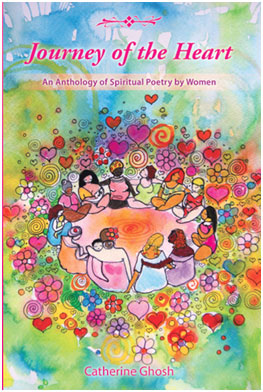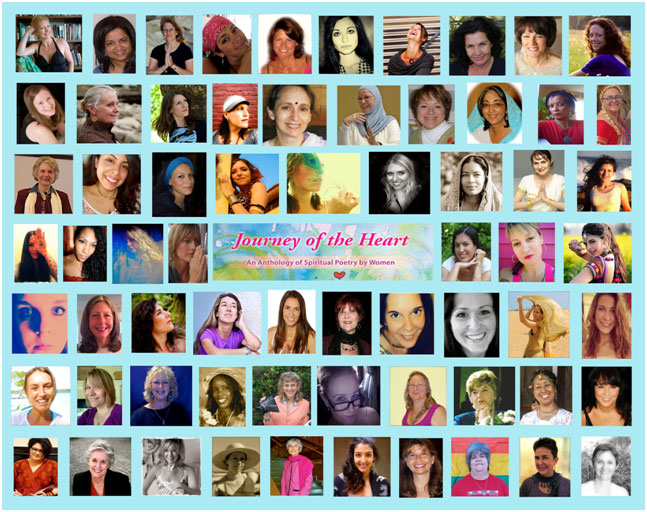By Catherine Ghosh
“JOURNEY OF THE HEART”

I’ve always been intrigued by the language of poets, how, through poetic expression, we can reach people from other faiths where prose falls short. So nearly two years ago I launched an interfaith project, inviting women to share their spiritual sentiments with one another through exchanging their poems. When we write poems, we draw lines between our hearts and our voices, becoming cartographers of the heart’s lively shoreline. This shoreline immediately becomes familiar to us, I’ve discovered, regardless of how unfamiliar we are with an author’s particular faith.
The Journey of the Heart poetry project began as an online community. Inspired by the ancient sisterhood of the Gopis, whose poetic voices resound at the heart of the Bhagavata Purana, an oral tradition over 1,000 years old, I sought to create an unintimidating, open circle into which women’s voices from all traditions would be welcomed. Gopis were celebrated for the unique qualities they brought to their relationships with Divinity as Krishna, and for the manner in which they each brought out these qualities. Just so I hoped the women participating in this project would also support one another during their own unique, personal spiritual journeys.
Krishna with the Gopis – Photo: Wikipedia, Smithsonian Freer and Sackler Gallery
Over the course of two years, this is indeed what happened. As the poetic voices of the women emerged, so did a beautiful and nurturing dialogue among them. From Muslims to Jews, Catholics to Hindus, Pagans to Tantrics, the poetry between the diverse participants unveiled intimate glimpses into their own faiths as they heard their own voices echoed in the faith of others. Spontaneous friendships developed, and the women’s spiritual poetry project began to soar.
What was it about the writing and sharing of poetry that produced meaningful relationships between women of various faiths so swiftly?
It became apparent that in communicating through spiritual poetry, the heart takes precedence over the ego and the intellect. This sets a foundation for deeper exchanges, with participants more open with each other. Exercising trust in their own voices and in the community’s ability to welcome their voices, judgments were suspended. More personal narratives unfolded, shedding light on the intimate role poetry had begun to play in their spiritual lives.
Journey of the Heart participants expressed entering into meditative and awakened states when writing. Some described it as trance-like – poetic musings as a means to connect with their core, their deepest self, and their own divine essence:
“Writing a poem is a pure spiritual process for me. When I feel the flow of poetry it’s like a wave of light is running through me. I find myself in enlightened space, existing within the moment, merged with this creative force. It’s communicating with the Soul on a most intimate level … It’s a very conscious process and also very beautiful. I love these sacred moments.” – Andreja Cepus

Others described the experience as prayerful, or as becoming an instrument through which the poem flowed.
“Poetry-writing is an opening up of all my channels to Spirit: to my deepest self and the widest, infinite extremities of everything. It’s a form of prayer, or worship, a way of reaching out to Beyond, and also a way of being grounded in my human body, here and now.” – Ruth Calder Murphy
Still others clothed poetry in a kind of universal romance.
“Poetry is an intricate dance of love and heart. It languishes by the sea and dips into the storms. Poetry has an eloquence of bittersweet joy and a splash of melancholy. Poetry is love!” – Carolyn Riker
It is fascinating to listen to a poet describe her creative process. Tracing the exact origin of a poem is often laced with as much mystery as is tracing the origins of the cosmos. Where a poem comes from, and how it begins, is a secret that weaves beautifully elusive threads between the poet and her poetry.
Poets were held in high esteem by many ancient cultures for the divine insights that were believed to flow through them. Being seen as vessels of divine expression gave poets incredible artistic freedom to create without inhibitions, for great art flows independently of limits and judgments. Poets were the “makers” of such art, as the Greek origin of the word indicates.
Since then, there has been a special receptivity to poetic expression. We not only more easily embrace the voices of poets, but we hear our own voices in theirs as well.
“Most poems I read become spiritual soul food for me. They tap into a place of my heart where I breathe the words in. I feel them become a part of me as they resonate to something happening in my own life.” – Maureen Kwiat Meshenberg.
Although each process is as unique as the particular poet, each gives the sense that there is something undeniably mystical that happens in the making and delivering of a poem: something which, unlike the characterizations of the past, feels very much like descending grace, dialoguing with divinity, even existential satisfaction. Many of these poems draw delightful parallels between the irresistibility of writing a poem and the very flow of life itself:
“Poetry is a process of self-exploration and source of devotion to Truth and Love. Poetry anchors me in that place within that connects with that Source that is never ending. From this place, there is such acceptance, love, joy, and Grace.” – Nancy Carlson
Whether their poems trickled into the project timidly or arrived in powerful waves, contributors observed a mysterious beauty to the natural waxing and waning of their voices. Regardless of tradition, they all described poetry as an integral part of their spiritual practices. The poems gave voices to their souls:
“I find the times that I write what I consider to be my best or most heart-felt poems are when I switch off and let myself flow and … my soul begin to speak.” – Zoe Quiney
Within the Journey of the Heart sisterhood, each voice was heard and honored in ways many of the participants had never experienced before. In sharing poems their voices found new skies to fly, inspiring others to do the same.
“Reading the poems of others taps the locked words inside me and frees them, like you would rattle the cage of a dove who hesitated to fly out the open door. They give me wings.” – Braja Sorensen
Perhaps, in the landscape of the world’s religious traditions across the centuries, it is especially significant that women’s voices find new wings. Their wings have been clipped most often. Hosting this project, it became painfully obvious how many women still hesitate to express their voices within their own religious communities or with those of another faith. In our poetry, however, barriers were easily broken, voices released in the most uninhibited ways. Then the spiritual insights of women flow confidently between faiths as easily as heartfelt conversation between sisters.
Since late 2012, the Journey of the Heart project has shared over 600 poems by hundreds of women from all over the world of various faiths. Last summer we published our first book, Journey of the Heart: An Anthology of Spiritual Poetry by Women (Balboa Press, a Division of Hay House, 2014.) It serves as a testament to the power of poetry to facilitate peaceful, heart-to-heart exchanges between us all.
Creating alternative communities, virtual or actual, where people can unite and share the many ways in which they experience the divine, without feeling judged or criticized, is a necessary step toward cultivating peace in our world. Many women found the Journey of the Heart forum to be such a place:
“This amazing community has been a true blessing to me. I am profoundly grateful Journey of the Heart has given me the opportunity to dive deeply into my heart and the hearts of others.” – Krista Katrovas


